| |
 Find out where you are today Find out where you are today
The motto of PsykosyntesForum is "Find your Self".
With the Self Psychosynthesis means your Higher I, the place deep within yourself where you actually know what you want with your life, and how you want to be as a person.
But, how
does one go about to find one's Self?
We do not know what your Path is, but we can offer coaching, therapy and/or
on-line tools with the help of which you can get the guidance and the tools you need on your Inner Journey. |
 |
Everything presented on this page can also be found on other pages, as Courses, Sitemap, Services and Webshop, but via this guide our services and products will be presented in a more logical way, in which you will be led through a process describing the "normal case" in personal growth.
|
Before going through this guide,
PRINT OUT THE GUIDE FORM by clicking on the image to the right ->
This document consists of the same text as in the sections below.
Go through the questions and mark the statements you feel correspond to yourself.
(This phase takes approximately 20 minutes.)
After this, with the help of the filled-out form, go through this page, in which you will be able click to come to information and suggestions. |
 |

|
Get yourself paper and pencil for writing down what in the services and products from Psychosynthesis Forum you think can be useful in helping you to find your Self.
It may be coaching, therapy, e-courses,
e-books or a combination of these. |
| |
 The order of the steps does not mean that they are ready in that order The order of the steps does not mean that they are ready in that order
|
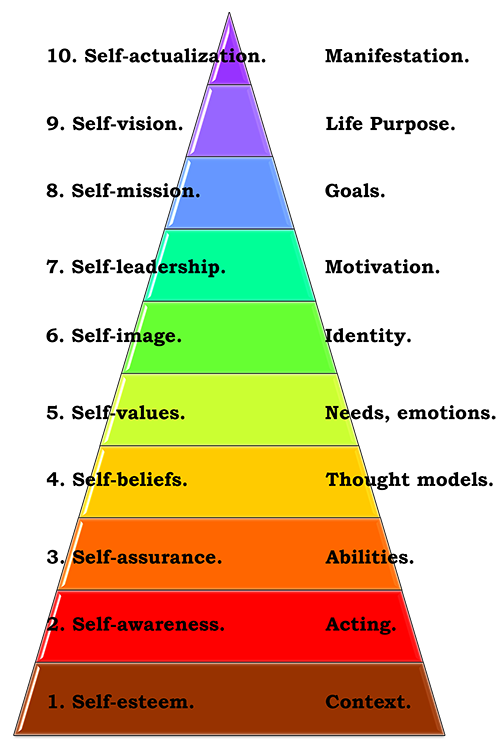 |
The ten different levels of the search for one's Self are a crude description of the chronological order for the different development stages of the child and young adult.
But, for an adult, to have reached a certain level does not necessarily mean that all the levels "below" are ready - on the contrary, certain levels are usually more developed than others, and one often has to "back up" and "finalize the job" that was not completed during the upbringing.
Each of the ten different levels will be explained briefly here below, and under each summary you will be able to click to come to specific pages about each level.
On these separate pages the level is explained a bit more at length, and the coaching or therapeutic tools relevant at this level are described.
You will also be able to link forward to detailed descriptions of the methods and tools. Some of the tools are available as e-courses for self-studies or in cooperation with a coach or therapist.
|
| |
 1. SELF-ESTEEM 1. SELF-ESTEEM
|

|
The first level in finding one's Self is to explore what one feels about oneself, in different contexts. |
Many suffer from poor self-esteem, in spite of having “succeeded” in their professional life or socially. The causes of poor self-esteem differ a lot from person to person, and poor self-esteem is often established during one’s upbringing.
Read the page 1. SELF-ESTEEM if
- You suffer from poor self-esteem.
- In reality you know that you can manage,
but despite this you don’t believe in yourself.
- You often feel insecure with other people.
- You have often thoughts about others looking down on you.
_________________________________________
On the other hand, if
- You like yourself, and you have excellent self-esteem.
- You are optimistic even when you feel uncertain,
knowing that ”I will fix this”.
- You feel at ease with other people.
- You respect yourself and you communicate
in a clear way what you want.
this probably means that you are fairly ready with this level.
Continue to the next one:
|
|
 2. SELF-AWARENESS 2. SELF-AWARENESS
|
 |
Next level in finding one’s Self is to become aware of what one does and how one acts in different situations.
Many focus on why they end up in negative situations, without making themselves aware of what it may be in their own way of acting that may have contributed to the negative outcome. |
Read the page 2. SELF-AWARENESS if
- You often react without reflecting on what you really are saying.
- You end up in conflicts which you don’t know how they arose.
- You think you express yourself in clear ways,
but you still often become misunderstood.
- You sometimes repeat the same mistake over and over.
_________________________________________
On the other hand, if
- You are always aware of what your emotions stand for,
and you can choose whether to act on them or not.
- You know what you want,
and you take a conflict when it is necessary.
- You communicate in a calm and clear way,
and even when others disagree, they understand what you are saying.
- You sometimes make mistakes, as everyone does, but you always reflect on how you want to act next time.
this probably means that you are fairly ready with this level.
Continue to the next one:
|
|
 3. SELF-ASSURANCE 3. SELF-ASSURANCE
|
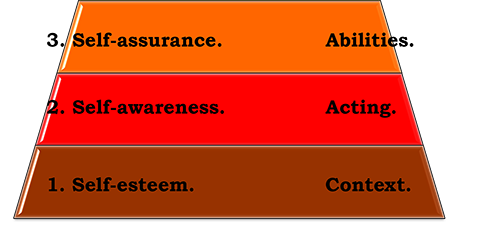 |
To have a good self-assurance is to trust one’s abilities.
It is also to realize that competence consists of both the areas
“what I know that I can” and
“what I know I can’t”.
Disregarding which of these is the case, one makes no mistakes. |
Read the page 3. SELF-ASSURANCE if
- You often feel uncertain of yourself and
you have poor self-assurance.
- You never believe that you have prepared enough for a task.
- You often ask others for advice,
even when you in reality know the answer.
- Most of the time, you think others’ abilities are superior to yours.
_________________________________________
On the other hand, if
- You have an excellent self-assurance.
- You know when you are sufficiently prepared for a task.
- You ask others for advise
when you realize that you need information.
- Things you have decided to manage,
you always become good at.
this probably means that you are fairly ready with this level.
Continue to the next one:
|
|
 4. SELF-BELIEFS 4. SELF-BELIEFS
|
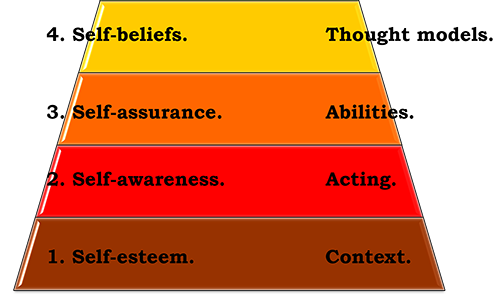 |
"Whether you believe
that you can
or that you cannot,
you will be right"
(Henry Ford)
Beliefs one has about oneself will always control one’s actions more than knowledge or common sense. |
Read the page 4. SELF-BELIEFS if
- Your beliefs about yourself are emotional and
are often illogical and lack connection to reality.
- You limit yourself because of your negative beliefs about yourself,
your inabilities or your shortcomings.
- You have had your negative thought patterns as long as you can remember, many are results of conditioning during your upbringing.
- Many of your negative beliefs come by reflex,
without conscious thought or reflection.
_________________________________________
On the other hand, if
- Your beliefs about yourself are positive and realistic and
are grounded in experience and reflection.
- You motivate and empower yourself with your positive beliefs about yourself and about your abilities.
- Your positive thought patterns are the result of your conscious work with yourself through which you have become a mature person.
- After having often consciously felt proud of yourself,
your positive beliefs about yourself have become a good habit.
this probably means that you are fairly ready with this level.
Continue to the next one:
|
|
 5. SELF-VALUES 5. SELF-VALUES
|
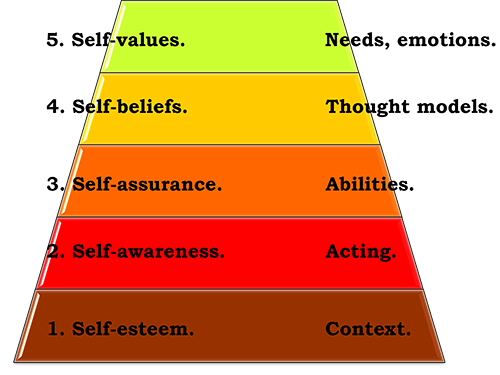 |
Companies and institutions often have a clear ”Value Base” communicated both verbally and in writing, and which they want each employee to understand, sympathize with and live up to.
But, on the level of individuals, the Value Base is sometimes not even brought up into conscious awareness. Even if most persons have personal values, and they know what the regard as important, they have sometimes not made it really clear to themselves.
The result of this can be that they find it difficult to assert themselves in front of others’ opinions, basic values and needs, even when these come in conflict with their own. |
Read the page 5. SELF-VALUES if
- You often become sad, irritated, angry or frustrated,
but you find it difficult to put words on why.
- You don’t know what your basic needs are,
and/or you find it difficult to assert them.
- You are often heavily influenced by the expectations and desires of others, and you sometimes feel uncertain in ethical dilemmas.
- You are not clear about what is important to you and what you really want out of your life.
_________________________________________
On the other hand, if
- You accept all of your emotions, and you know that they stand for your basic needs either being met or not met.
- You know what you need, and you can communicate your needs in a clear and constructive way.
- You are guided by an inner compass that shows you your important basic values. In ethical dilemmas, you intuitively feel what is right for you.
- You always know what you want to prioritize for yourself, and you have a clear sense of how you want your life to be.
this probably means that you are fairly ready with this level.
Continue to the next one:
|
|
 6. SELF-IMAGE 6. SELF-IMAGE
|
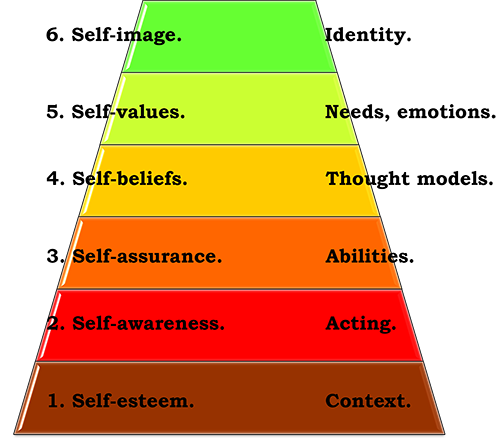 |
Self-image is literally the inner ”image” one has of oneself. One aspect of this image is naturally visual, but it also contains values, emotions, body sensations, visual and audial memories.
One has what is called a negative self-image, if one subconsciously has placed negative memories “in the foreground”, and one judges oneself in negative ways, and this gives rise to emotions like inferiority, resignation, bitterness, etc.
As all inner images one creates, the Self-image has even more the character of becoming a self-fulfilling prophecy. |
Read the page 6. SELF-IMAGE if
- You focus on your shortcomings and your negative traits and you remember the negative things you have done more than the positive.
- You don’t think you can contribute with anything of any worth.
- You take criticism personally and you feel bad, as criticism always reminds you of your earlier mistakes.
- You see yourself as one that does not deserve respect,
and you loathe seeing yourself in a mirror.
_________________________________________
On the other hand, if
- You focus on your strengths and your positive traits.
- You regard yourself as one that contributes and
you often feel valuable.
- You take criticism in a constructive way,
as valuable feed-back to learn from.
- You respect yourself, and when you see yourself in a mirror,
you feel that you like yourself.
this probably means that you are fairly ready with this level.
Continue to the next one:
|
|
 7. SELF-LEADERSHIP 7. SELF-LEADERSHIP
|
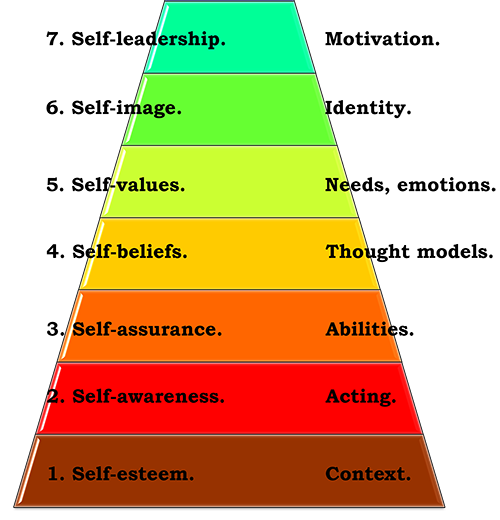 |
Self-leadership works well in a person with a positive self-image, and who knows what he or she values in life.
Persons with good self-leadership create positive and attractive goal images that feel motivating.
Self-leadership also means freedom: in each situation one is able to look at it from different perspectives and from this see many different ways of action, where one consciously chooses the one that feels best for oneself and others.
A person with good self-leadership acts in a conscious way, instead of re-acting subconsciously.
Good leadership depends on good self-leadership. |
Read the page 7. SELF-LEADERSHIP if
- You react on most things out of habit and without reflection, and the outcome is often not what you really had wanted.
- In most cases you see only one possible way of action and you sometimes feel like a victim of circumstances.
- You find it difficult to motivate yourself, and you often postpone things that do not feel fun.
- You are a poor planner and you find it difficult to finalize things, and when you encounter obstacles you easily give up.
_________________________________________
On the other hand, if
- You wait with acting until you have understood the situation, and then you act purposefully until you have achieved what you want.
- You always see several different ways of action, and you can select the one of these that will lead you best to where you want.
- You motivate yourself by visualizing the outcome you want to achieve, and you are focused when you start acting.
- You are a good planner, both short and long term, and when you encounter obstacles you re-plan and continue to work.
this probably means that you are fairly ready with this level.
Continue to the next one:
|
|
 8. SELF-MISSION 8. SELF-MISSION
|
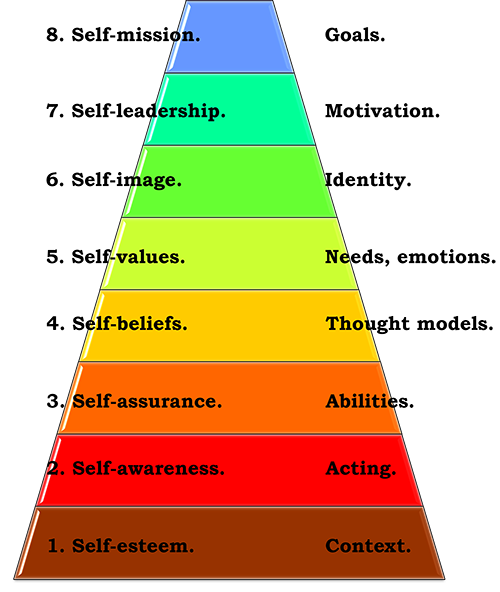 |
The term Self-mission implies that you consciously formulate the Mission you want to commit to in order to reach your Life Goals.
”The Mission Statement” works best when it answers the following three questions:
1) What is the goal?
2) How shall it be reached?
3) For whom is it done,
__what is the purpose?
A clear, well formulated and communicated Mission Statement will make you experience meaningfulness, positive expectation and resolution.
With a clear personal Mission you will be able to prioritize among the tasks others give you, or that you are expected to do. If these do not correspond with your own Mission, you can say No Thank You, in a pleasant but firm way.
|
Read the page 8. SELF-MISSION if
- You don’t know and you haven’t reflected on your life goals,
you live life as it comes and try to adjust.
- You dream of things you want to achieve, but it remains longing and daydreaming and in reality you do nothing to come there.
- You can sometimes feel that you want to follow your heart, but then you think ”the road to hell is paved with good intensions…”
- You remember everything you have tried to do but failed with, and when you think ahead you see only difficulties and obstacles.
_________________________________________
On the other hand, if
- You are totally clear about your life goals, and you create your life in a conscious way so that you feel that you am on your way there.
- You know what you want to achieve both short and long term, and you plan in concrete ways, breaking tasks down into achievable parts.
- You feel strongly that each person’s life has a meaning, and that each one that seeks will find one’s own Mission.
- You focus on the goals you have put up for yourself, and on the inner and outer resources that will help you to come there.
this probably means that you are fairly ready with this level.
Continue to the next one:
|
|
 9. SELF-VISION 9. SELF-VISION
|
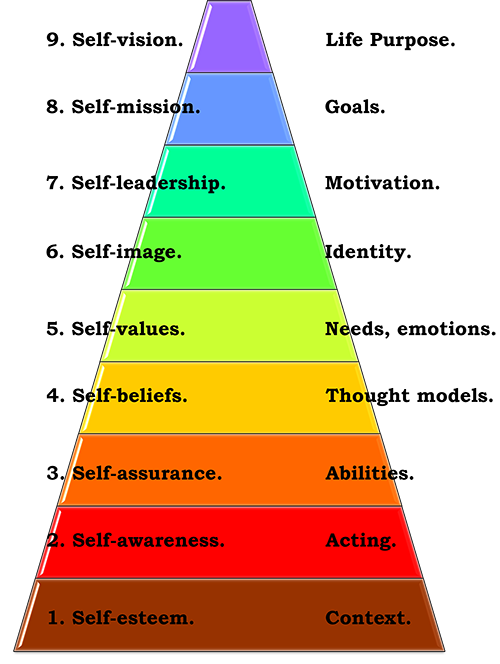 |
This term stands for the personal visions you have for your life, the images of what you want to have achieved when you have fulfilled your Mission or the part goals.
Visions can be created in different ways – in words, as an inner image, as a feeling of how it would be to have had reached the goal.
To create your vision in a conscious manner in all of these ways, and to also write it down or illustrate it on paper, will lead to subconscious inner images that will give you energy and a sense of direction.
To have formulated and communicated your vision will activate both your inner resources and the external resources you need to reach your goal.
When individual persons, groups, companies or organizations lack visions, this usually leads to stagnation… |
Read the page 9. SELF-VISION if
- You don’t have a clear image of what you want to achieve, and you can therefore not describe it to anyone else either.
- You feel that visions are something dreamers and idealists occupy themselves with; a sensible person is realistic and works in practical ways.
- You sometimes feel inspired by people with strong visions, but you don’t think you can be that way, they are ”special”.
- You interpret each obstacle, each delay, each problem, as signs of that your vision is unrealistic and impossible for you to achieve.
_________________________________________
On the other hand, if
- You have a clear vision of what you want to achieve, and you often describe it to others in a captivating way.
- You know that a vision is a magnet that will help you to prioritize and to choose the path of action that leads there.
- You let yourself feel inspired by your vision, and you allow yourself to already now feel the happiness you know will be there when you have reached the goal.
- You see every obstacle or problem as a new opportunity for you to become even better at striving towards what you dream of.
this probably means that you are fairly ready with this level.
Continue to the next one:
|
|
 10. SELF-ACTUALIZATION 10. SELF-ACTUALIZATION
|
 |
The word Self-actualization means discovering and expressing one’s Self, one’s Higher I.
In order to be able to express and to act from one’s Self, one is helped by having worked through the majority of the levels below.
But, the experience of being one’s Self, being the Higher I, can also come spontaneously. Many can experience it as a brief moment of experiencing being One with Everything.
If one is able to stay in one’s Self, then one knows one’s Vision and one’s Mission, then one will lead and motivate oneself, then one knows who one is and what one wants, one is able to observe oneself, one’s thoughts and emotions, and one has the ability to choose and to prioritize, and one manifests one’s Self in everything one does. |
Read the page 10. SELF-ACTUALIZATION if
- You feel alone with your dreams, and it feels difficult to find a context that would support you.
- You often doubt yourself, despite the fact that you know what you want and where you want to go.
- You have visions, but it feels like you constantly need to revise them, due to unforeseeable things that happen in your life.
- You want to believe in a spiritual dimension, but as you never see any clear indications of that it exists, you often doubt that it does.
_________________________________________
On the other hand, if
- You know you share your dreams with many, and seemingly by random they cross your path with the help you just then need.
- You burn for your Vision and your Mission, and you carry a conviction that you have what you need.
- You often have to re-prioritize and to change your actions plans, but only so that you again find the path that leads to your Vision.
- You often experience things that tell you that you are led by Someone that knows you and that has a plan for you and your life.
this probably means that you are fairly ready with this level.
|
| |
 What is your next step? What is your next step?
I hope you have found this guide useful, and that you have found the tools you need among the products and services we offer. |
The path towards finding one's Self can feel long, but "The journey starts with the first step". And the best investment you can do, is investing in yourself.
If you have questions, mail me !
Good luck

|

Lars Gimstedt
|
| |
 |
 |
 |
|






















